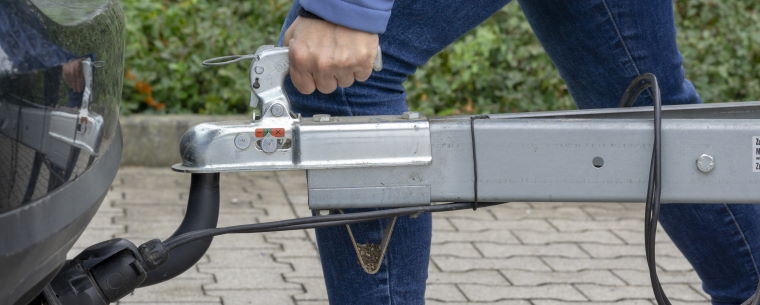What is the payload of your vehicle? All you need to know
Bradley Jando | Tuesday 23rd March 2021 11:28am

You may have heard the term “payload” used in reference to your car or truck – alternatively, you may have heard “carrying capacity”, “towing capacity”, “maximum gross weight”, or even “maximum gross mass”. But what do they refer to?
In short, the references to “payload” and “gross weight” tend to refer to the maximum amount of weight you can have loaded on or in a vehicle. While towing capacity refers to the maximum weight that your vehicle can tow.
All vehicles will have a certain weight when unloaded – without any passengers or cargo - just what comes as standard within the vehicle. This is known as curb weight. Depending on the vehicle in question, this could be 980kg (for some Vauxhall Corsas) or it could be 1790kg (for a Mitsubishi Warrior). Whatever the curb weight is, there will be a maximum allowable extra weight that you can add to the vehicle.
What is a chassis?
Firstly, you need to be aware a chassis is the load-bearing part of a vehicle. You can read all about chassis and frames in detail here, but it’s essentially the horizontal frame on which everything sits. Different chassis are designed with different weight limits, in order to effectively use materials for whatever the intended use is.
The chassis of a large pickup truck will usually be made of thicker metal than a hatchback’s frame - welded together in stronger shapes to be able to bear more weight.
Maximum Gross Weight (or Gross Vehicle Weight Rating)
The Maximum Gross Weight or GVWR is the maximum weight that you can put on your vehicle. If you exceed this weight, it may not immediately break, but it could make driving significantly more dangerous. This is because parts of the vehicle, like the brakes and shock absorbers, won’t be suitable for carrying such a large load. What’s more is that you could permanently damage your vehicle by overloading it, as weight in certain areas could bend the frame in unexpected ways.
The Gross Vehicle Weight Rating is the Curb Weight plus however much additional weight is safe to add.
How to calculate the payload for your car
You can simply take away the curb weight from the Gross Vehicle Weight of your vehicle in order to get the payload. So, let’s take the Vauxhall Corsa example: its Gross Vehicle Weight is 1619kg and its curb weight is around 940kg, so its maximum payload would be 679kg.
This payload has to account for the driver and any passengers, so don’t expect to have five people in your car and still be able to load it with holiday baggage adding up to 679kg!
How to calculate towing capacity
To calculate towing capacity then you need to know your vehicle’s Gross Combined Vehicle Weight Rating. This is often much more than the maximum weight rating of your vehicle, because the majority of the weight on a trailer is taken on the trailer’s axle and frame.
To work out whether it is safe for your vehicle to pull a particular trailer, then you need to know the trailer tongue weight. This is the weight that the trailer’s tongue (the front bit with the hitch on it) exerts downwards. You need to know this because it’s this weight that you’re going to have to account for when factoring it into your vehicle’s payload.
The tongue weight of the trailer is usually between 10-15% of the total weight of the trailer. So, you need to calculate the unladen weight of the trailer, add the weight of whatever load has been added to it, and then work out 15% of that.
Let’s say your trailer weighs 400kg unladen, and you’ve added an 800kg, your sum would be:
400kg + 800kg = 1200kg
Then multiply it by 0.15 to find 15%:
1200kg * 0.15 = 180kg
This 180kg is what you would take away from your maximum payload.
Why is it important to know this?
Well, you could simply look at your user manual to find some of this information, but some of the information is based on unrealistic expectations. For example, a maximum towable weight might be calculated based on only a driver being in a car, with nothing else inside it. But, realistically, you may have more than just yourself in your car – you’ll likely have things in the boot, passengers, luggage, and so on! So, being able to calculate this yourself means you’ll never accidentally exceed any limits.
Are you worried about your car?
Have you accidentally overloaded your vehicle and are worried about its brakes or suspension? Give your local Kwik Fit a call, and we can inspect your car and let you know if anything needs attention.
Any facts, figures and prices shown in our blog articles are correct at time of publication.
Featured Articles
Is it Illegal to Drive With One Headlight?
Saturday 19th July 2025
Wondering if it’s illegal to drive with one headlight? Learn about the safety risks and penalties of illegal blown bulbs and why you should fix them promptly.
Air Con in EVs & Hybrids: Experts Answer Your Questions
Monday 30th June 2025
Does air con drain EV batteries? Can you use the air con while charging an electric car? Find out the answers to these questions & more from Kwik Fit’s experts.
Why Is Your Car Making a Noise? Fixes & Tips
Friday 13th June 2025
When your car starts making unexpected noises, it can certainly be quite disconcerting; it may be nothing to worry about, but here’s what you need to know.









